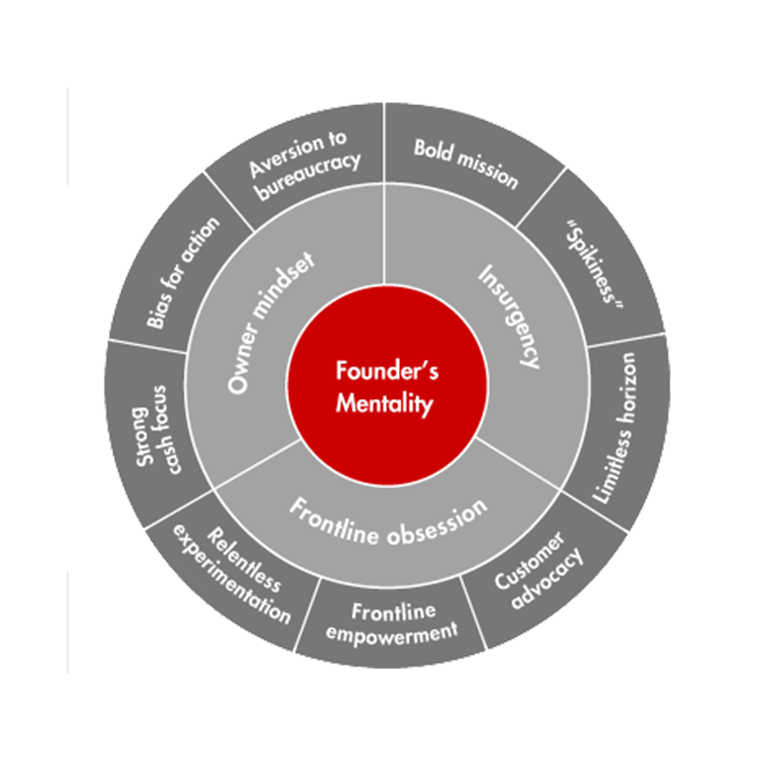Founder's Mentality Blog
I wrote this post aboard Lan 750, the morning flight from Santiago to Sao Paolo, hoping the sun would come up before takeoff so I could watch the sun rise over the Andes. I had just finished a week in Brazil and Chile talking to the founders of a dozen South American companies about the Founder’s MentalitySM. All of them are working to ensure the legacy they leave their companies is the sense of insurgency, the owner’s mindset and the obsession with the front line that marked their companies during their founding periods.
That’s not an easy task as a company grows and the founders bring in professional management teams. One of the challenges both face is understanding how to lock in the Founder’s Mentality and the role that routines play in that process. Both founders and management of Great Repeatable Model companies focus on the ways their company is differentiated from their competition, and seek to translate this differentiation into frontline routines that the entire organization supports. The founders of any successful company intuitively understand that their strategy isn’t really a strategy at all if it isn’t evident in frontline routines and behaviors.

About the Founder's Mentality
The three elements of the Founder's Mentality help companies sustain performance while avoiding the inevitable crises of growth.
Luiza Helena Trajano, president of MagazineLuiza, is a perfect example of a leader with Founder’s Mentality who focuses on the front line. MagazineLuiza is a leading retail brand in Brazil. With more than 740 stores and 23,000 employees, it serves a growing Brazilian middle-class seeking to furnish their first houses and apartments with furniture, electronics and other household products.
Luiza’s aunt and uncle founded the current company in 1957, and her aunt worked there until three years ago. Luiza Helena began working in her aunt’s store when she was 12 and began running the company in 1991, when it had 30 stores.
Luiza is a larger-than-life personality and one of the most well-known business leaders in South America. One of her most important roles at MagazineLuiza is championing the store manager and his or her staff. As the company increases in scale and adopts a more professional management structure, she is determined to keep the store as the unit of value creation, where the store manager has all the power and information needed to serve local customers.
“I know we must continue to be more professional as we grow,” Luiza says. “That is important. But I also know that we must keep the store manager as king or queen of the company, with all of us working to serve their needs. Many forces work against this as we try to harmonize pricing, buying, etc. That’s why I have to remain the voice of the front line as decisions are made. We cannot lose focus on who’s the real boss: It is our store manager.”
This attitude is the essence of Founder’s Mentality.
As noted, many founders also are passionate about the key routines and repeatable models that drove the early success of the business. They constantly monitor these routines using their own personal rules of thumb, and most of them worry that when they leave, the focus on these routines will be lost.
But the professional managers I spoke to during my trip through Brazil and Chile have a slightly different concern. They, too, want to lock in the Founder’s Mentality and see it reflected in frontline routines. But they don’t want to confuse preserving the Founder’s Mentality with a rigid adherence to specific routines that can never change.
As one COO told me, “Of course we want to keep the Founder’s Mentality. But sometimes our founders also fight to keep routines or ways of working that are frankly past their sell date.”
These managers often note that the business has outgrown its old routines, has moved into new businesses with new competitors or has expanded internationally. Their goal is to work with the front line to create new routines—routines that are grounded firmly in the Founder’s Mentality, but more suited to the next wave of growth.
That is, after all, how successful companies adapt to growth or new technologies or changing customer preferences. Indeed, the signs of change are often first detected on the front line, which is why the front line plays such a critical role in creating the routines that apply the company’s repeatable models to their new situations.
Professional managers are eager for founders to support this, and that is also why leaders like Luiza insist on keeping the power on the front lines even as they embrace professionalization.
At other companies, however, professional managers sometimes find their efforts to update routines devolve into battles about the founder’s legacy. As I spoke with both managers and founders, we agreed that founders should focus on championing the Founder’s Mentality itself, rather than the routines that epitomized it during the early days of the business. This is exactly what Luiza does at MagazineLuiza. As one of her managers noted, “She is the champion of the front line. She believes that should be an eternal mission for the company. But she also recognizes the front line needs the latest tools and routines to win—and as their champion, she is constantly fighting to update routines.”
Perhaps that distinction between Founder’s Mentality and old routines is exactly what other founders and their professional managers should be discussing as they determine what they need to take their companies forward.